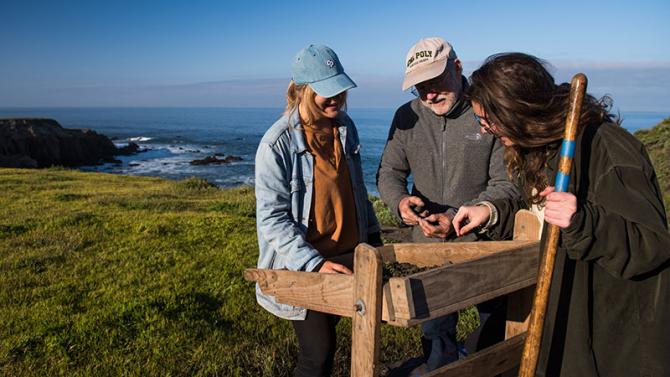Anthropology and Geography
College of Liberal Arts
Anthropology is the study of what makes us human, through examination of past and current civilizations. Geography is the study of the earth's places and the relationships between people and their environments. Integrating the two disciplines allows you to examine the relationship between humans and their environments in an increasingly globalized and diverse world.
San Luis Obispo, California
You will study many aspects of both anthropology and geography, training in the disciplines’ most cutting-edge methodologies and technologies. You will also be required to complete an internship or participate in a study abroad program, taking what you learn in the classroom and applying it in the field.
Environmental Studies and Sustainability
This concentration will help you understand and use environmental science, sustainable development, and geospatial technologies, including GIS and remote sensing, to analyze the human impact on the Earth. Sustainable solutions for resource use and environmental management are emphasized.
More about Environmental Studies and Sustainability
Global Studies and International Development
Learn the skills necessary for internationally-focused careers in private, public, and non-profit development organizations, the Peace Corps, foreign service, public health, education and numerous jobs where cross-cultural understanding is essential. You will gain an in-depth knowledge of globalization and the social, political, economic, and ecological dimensions of international development.
More about Global Studies and International Development
Human Ecology
In this concentration, you will learn about the natural environment, human behavioral and cultural systems, and the complex relationships between the three. Courses cover human evolution, how human culture and behavior impacts the environment, prehistoric and recent environmental change, indigenous cultures of the New World and methods for analyzing climate change and related human responses in the past and present.
Individualized Course of Study or a Minor
Working with a faculty advisor, you’ll select 28 units to design your own course of study which meets your individual needs and interests. You may also complete a minor from another department or program as your concentration.
About the Program
Anthropology and geography provides an in-depth knowledge of ecology and the historical place of humans around the globe.
You will gain an understanding of the cultural and physical attributes of major world regions, key regional issues, the processes that shape cultural change and interaction and international development issues. You will train in cutting-edge technologies and take what you learn in the classroom and apply it in the field through special projects and internships. By learning how to apply these acquired skills in California and around the world, you can contribute to improving the state of the environment and the human condition.
Learn by Doing
Anthropology and geography will prepare you to apply science and technology to address the world's most important social, global, and environmental issues. You will learn how to collect, synthesize, and interpret data using a variety of archaeological field methods, including geospatial technologies like GIS, remote sensing and GPS. You will also learn to analyze the processes that shape the earth’s physical environment, the distributions of natural resources and the ways in which humans use natural resources and impact the environment with an emphasis on sustainability.

Assist with Rescue Excavations
Learn MoreOur Graduates
With a broadly-based orientation to the study of society, you will develop skills that can be applicable to a wide range of careers.
Our graduates have gone on to careers in elementary, secondary, and post-secondary teaching; federal, state and local governments; conservation and environmental management; geospatial technologies; cultural resource management; non-governmental organizations; international development; and business and industry.
